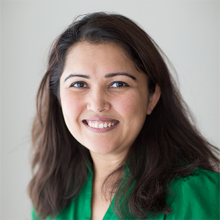Pakistani Aid Worker is Citizen of the World but Calls Oregon Home
Date: June 16, 2017
When Amarah Khan arrived at the Houston airport from Pakistan as a fresh-faced 23-year-old student, immigration officials detained and questioned her for five hours, she says. “You can imagine what a rude awakening this was for me. This was my first time on a plane, and I thought I was finally realizing this glorious dream of coming to the United States,” says Khan, who was starting an internship at the United Nations World Food Program before pursuing master’s degrees — in international development and in public policy and management — at the University of Oregon. “I kept asking myself, ‘What have I done wrong?’ I wondered if it was because I was wearing the hijab or because I had an accent.”
Khan now understands that she was the victim of the post-9/11 political climate. Such suspicions of immigrants still exist, she says, except now they are focused on undocumented residents. Khan attributes the response to a closed collective mindset that fears other ethnic and religious groups. That is a mindset she is actively trying to change as associate director for Global Diversity Initiatives at Oregon State University (OSU). “I’d like to create a culture of curiosity,” says Khan, who teaches cultural competency workshops to students and professors and manages a team of international and American students to promote diversity programs. “We all have cultural biases that we bring, and we have to seek to learn about others who act differently than us.”
I don’t know any immigrant who doesn’t carry their weight, plus the weight of the rest of the community.
Khan says that myths about immigrants fueled harmful rhetoric in the recent presidential election. “I’ve heard people say that immigrants don’t carry their weight,” says Khan. “But I don’t know any immigrant who doesn’t carry their weight, plus the weight of the rest of the community, on their shoulders.” In 2014, undocumented immigrants paid $21 billion in taxes, $13.5 billion of which went to the Social Security fund, which they ineligible to draw from. In Oregon, 23,420 immigrant entrepreneurs employ 70,165 people and generate $473 million in business income annually. And as to those notions that immigrants pose a threat: Between 1990 and 2013, a period when the number of undocumented immigrants more than tripled, the rate of violent crime in the U.S. fell by 48 percent. “In this current political environment, we need to repair the hurt and damage that’s been caused in immigrant communities,” says Khan.
Khan grew up in a conservative home in Pakistan, with limited knowledge of the outside world. After training as a foreign policy analyst at the University of Islamabad and earning her master’s degrees in Oregon, she returned to Pakistan to work as an aid worker. “I wanted to be a citizen of the world,” she says. “I had the freedom to design mobile health clinics in disaster-ridden communities. I had the opportunity to imagine big and know something bigger.”
She eventually returned to Oregon to earn her PhD in applied anthropology at OSU, married a Pakistani-American, and was hired four years ago to share her global perspective with the university community. One of her goals is to facilitate conversations with people who share different viewpoints. “I want to encourage domestic students to think about their impact on their globe and ask international students to share their culture with the local community,” she says. “I want people to know that being a global citizen has very little to do with having a passport. It’s a state of mind. It’s a sense of responsibility.”
